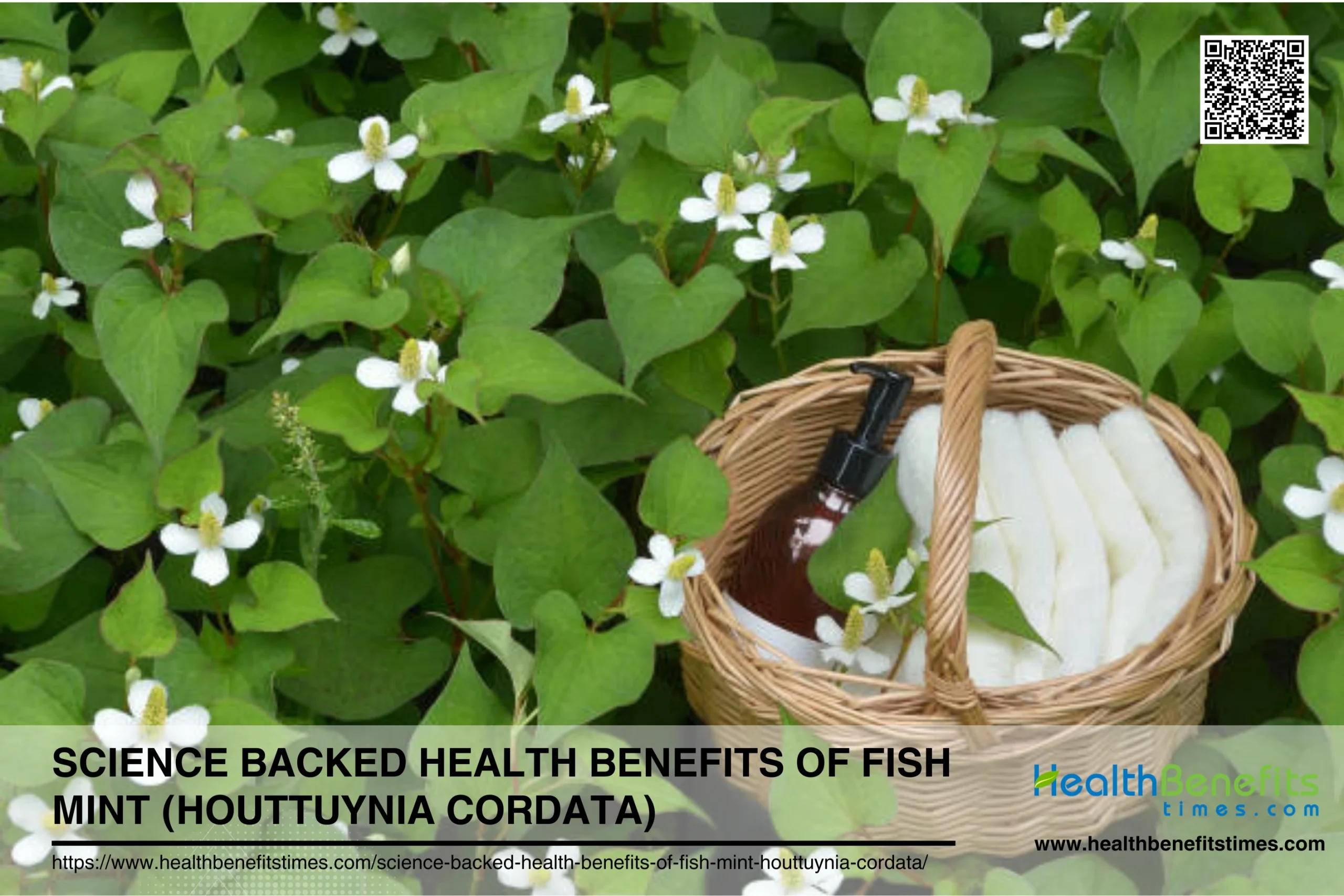- Fish Mint is a medicinal herb with diverse health benefits.
- Fish Mint is a versatile herb with health benefits, immune boost, antibacterial properties.
- Fish Mint reduces inflammation, inhibits cytokines, modulates genes, and pathways.
- Fish Mint detoxifies by diuretic, antioxidant, anti-inflammatory, and antimicrobial properties.
- Fish Mint can be used in salads, soups, stir-fries, and garnishes.
- Start with small amounts of Fish Mint, consult healthcare for safety.
 Fish Mint (Houttuynia cordata), also known as Houttuynia cordata Thunb, is a versatile medicinal herb with a rich history of traditional use across East Asian countries. This perennial plant, belonging to the Saururaceae family, has garnered significant attention in recent years due to its impressive array of health-promoting properties. Widely distributed throughout Asia, Fish Mint has long been valued not only as an edible vegetable but also as a potent medicinal herb in countries like China, Korea, Japan, and Vietnam. Its leaves and stems have been extensively used in traditional Chinese medicine to treat various ailments, including pneumonia, lung abscesses, and other respiratory conditions. As modern scientific research continues to unveil the plant’s bioactive compounds and their potential health benefits, Fish Mint has emerged as a promising natural remedy for a wide range of health issues, from inflammation and infections to cancer and diabetes. This article will explore the science-backed health benefits of Fish Mint, shedding light on its remarkable potential as a functional food and natural therapeutic agent.
Fish Mint (Houttuynia cordata), also known as Houttuynia cordata Thunb, is a versatile medicinal herb with a rich history of traditional use across East Asian countries. This perennial plant, belonging to the Saururaceae family, has garnered significant attention in recent years due to its impressive array of health-promoting properties. Widely distributed throughout Asia, Fish Mint has long been valued not only as an edible vegetable but also as a potent medicinal herb in countries like China, Korea, Japan, and Vietnam. Its leaves and stems have been extensively used in traditional Chinese medicine to treat various ailments, including pneumonia, lung abscesses, and other respiratory conditions. As modern scientific research continues to unveil the plant’s bioactive compounds and their potential health benefits, Fish Mint has emerged as a promising natural remedy for a wide range of health issues, from inflammation and infections to cancer and diabetes. This article will explore the science-backed health benefits of Fish Mint, shedding light on its remarkable potential as a functional food and natural therapeutic agent.
What is Fish Mint ?
Fish Mint is a perennial herb belonging to the family Saururaceae, widely recognized for its medicinal properties and use in traditional herbal medicine. This plant is notable for its essential oils, which vary in composition depending on the plant part and season, and exhibit significant allelopathic, antibacterial, antifungal, and antiacetylcholinesterase activities. Fish Mint is also valued for its pharmacological benefits, particularly its ability to accumulate flavonoids under drought stress, which enhances its medicinal properties. Additionally, the aerial parts of Houttuynia cordata have been shown to ameliorate memory impairment and reduce amyloid-beta deposits in Alzheimer’s disease models, suggesting its potential as a therapeutic agent for neurodegenerative diseases. Furthermore, dietary supplementation of Fish Mint powder has been found to improve the immune response in Nile tilapia, although it does not significantly affect their growth performance. These diverse applications underscore the importance of Fish Mint in both traditional and modern medicine.Top of Form
Nutritional Profile of Fish Mint
Fish Mint boasts a rich nutritional profile that contributes to its numerous health benefits. While specific nutritional data for Fish Mint is not provided in the search results, we can infer from its traditional use and medicinal properties that it contains a variety of beneficial compounds. Like many leafy herbs, Fish Mint is likely low in calories and high in fiber, making it a nutritious addition to a balanced diet. Its green leaves suggest the presence of chlorophyll, which has potential antioxidant and anti-inflammatory properties. The plant’s unique flavor and aroma indicate the presence of essential oils and other bioactive compounds that contribute to its therapeutic effects.
Overview of key nutrients and compounds
Fish Mint contains a diverse array of bioactive compounds that contribute to its medicinal properties. While the search results don’t provide specific information about Fish Mint, we can draw parallels from other medicinal herbs. These compounds likely include polyphenols, flavonoids, and various phytochemicals that contribute to the plant’s antioxidant, anti-inflammatory, and antimicrobial properties. The presence of these bioactive compounds explains Fish Mint’s traditional use in treating various ailments, including respiratory conditions and infections. Further research is needed to fully elucidate the specific compounds and their concentrations in Fish Mint.
Vitamins and minerals
Although the search results don’t provide specific information about the vitamin and mineral content of Fish Mint, we can make educated assumptions based on its properties as a leafy herb. Fish Mint likely contains a range of essential vitamins and minerals that contribute to its health benefits. It may be a good source of vitamin C, which supports immune function and acts as an antioxidant. The plant might also contain vitamin A, important for eye health and immune function, as well as various B vitamins. Mineral-wise, Fish Mint may provide potassium, magnesium, and calcium, which are commonly found in leafy green plants and support various bodily functions.
Flavonoids
Flavonoids are a group of plant compounds known for their antioxidant and anti-inflammatory properties. While the search results don’t specifically mention flavonoids in Fish Mint, these compounds are likely present given the plant’s medicinal properties. Flavonoids contribute to the plant’s ability to combat oxidative stress and inflammation in the body. They may play a role in Fish Mint’s traditional use for treating respiratory conditions and other inflammatory disorders. The presence of flavonoids would also contribute to the plant’s potential cardioprotective and anti-cancer properties, which are often associated with flavonoid-rich foods.
Essential oils
Fish Mint contains essential oils that contribute to its distinctive aroma and flavor, as well as its medicinal properties. While the search results don’t provide specific information about Fish Mint’s essential oils, we can infer their presence from the plant’s strong scent and traditional uses. These volatile compounds likely contribute to the herb’s antimicrobial and anti-inflammatory effects. Essential oils in Fish Mint may include compounds such as terpenes and phenylpropanoids, which are common in aromatic herbs and have been associated with various health benefits, including respiratory support and immune system modulation.
Alkaloids
Alkaloids are nitrogen-containing organic compounds found in many plants, often contributing to their medicinal properties. While the search results don’t specifically mention alkaloids in Fish Mint, these compounds may be present given the plant’s traditional medicinal uses. Alkaloids can have various physiological effects on the human body, including antimicrobial, anti-inflammatory, and analgesic properties. The presence of alkaloids in Fish Mint could contribute to its effectiveness in treating infections and inflammatory conditions, as well as its potential pain-relieving properties. However, further research is needed to identify and characterize the specific alkaloids present in Fish Mint and their individual contributions to the plant’s health benefits.
Science backed health benefits of Fish Mint
Are you ready to discover a hidden gem in the world of natural health remedies? Enter Fish Mint, a versatile herb that’s been making waves in scientific circles for its impressive array of health benefits. This unassuming plant, native to East Asia, has been a staple in traditional medicine for centuries, but modern research is now uncovering the science behind its healing powers. From boosting your immune system to fighting cancer cells, Fish Mint is proving to be a powerhouse of wellness. In this article, we’ll dive into the top science-backed health benefits of Fish Mint that might just make you want to add this herb to your daily health routine. Get ready to be amazed by the potential of this humble plant and discover why it’s catching the attention of health enthusiasts and researchers alike.
1. Beneficial for Alzheimer’s Disease
Fish Mint has shown promising potential in the fight against Alzheimer’s disease (AD), a prevalent neurodegenerative disorder characterized by amyloid-beta (Aβ) deposition and neuroinflammation. The herb’s ability to reverse memory impairment and reduce Aβ accumulation in AD models. Specifically, the aerial parts of Fish Mint, known as Houttuyniae Herba (HH), have been found to protect neurons from Aβ toxicity and regulate cholinergic dysfunction. Additionally, HH was shown to suppress the amyloidogenic pathway by increasing alpha-secretase expression and exert anti-neuroinflammatory effects by reducing glial activation and p38 phosphorylation.
What Research Says?
- Houttuynia cordata (HH) has been shown to reduce Aβ deposits in the brains of AD model mice, directly inhibiting Aβ aggregation and promoting the non-amyloidogenic pathway by increasing alpha-secretase expression.
- HH treatment ameliorated memory impairment in AD model mice, as evidenced by improved performance in behavioral tasks such as novel object recognition, Y-maze, and passive avoidance tasks.
2. Boost Immune System

Fish Mint is recognized for its remarkable ability to boost the immune system, making it a valuable addition to natural health regimens. Extracts of Fish Mint can significantly enhance the expression of various innate immune mediators, particularly in oral epithelial cells. For instance, studies show that Houttuynia cordata stimulates the production of antimicrobial peptides like hBD2 and secretory leukocyte protease inhibitor (SLPI), as well as pro-inflammatory cytokines such as IL-8 and CCL20, in a dose-dependent manner. This immune-modulating effect not only helps in combating infections but also supports overall immune function, which is crucial for maintaining health and preventing disease. Additionally, the herb’s anti-inflammatory properties further contribute to its role in enhancing immune responses, making Fish Mint a promising candidate for promoting immune health and potentially preventing immune-mediated diseases.
What Research Says?
- Dietary supplementation of Houttuynia cordata powder significantly improved skin mucus lysozyme and peroxidase activities, as well as serum immune responses in Nile tilapia, particularly at a concentration of 10 g/kg.
- Houttuynia cordata enhances immune barriers in the oral cavity, vagina, and gastrointestinal tract, showing broad-spectrum activity against various pathogens and tumors.
- Houttuynia cordata extract significantly induced the expression of innate immune mediators such as hBD2, SLPI, IL-8, and CCL20 in oral epithelial cells, suggesting potential for developing new topical agents for oral health.
3. Exhibit antibacterial and antifungal activities
Fish Mint demonstrates significant antibacterial and antifungal activities, making it a promising natural agent for combating various microbial infections. Essential oils extracted from Fish Mint exhibit potent antimicrobial properties against a wide range of pathogens. The essential oils from both aerial parts and underground stems of H. cordata have been found to possess strong antibacterial effects, with minimum inhibitory concentrations (MIC) ranging from 0.52 to 2.08 μl/ml, and bacteriostatic minimum bactericidal concentrations (MBC). Additionally, these oils display notable antifungal activities, with MIC values between 2.08 and 33.33 μl/ml and minimum fungicidal concentrations (MFC) ranging from 4.16 to 33.33 μl/ml. The antimicrobial efficacy of Fish Mint is attributed to its rich chemical composition, which includes compounds like 2-undecanone, myrcene, and various esters.
What Research Says?
- The essential oils of H. cordata exhibit significant antibacterial and antifungal activities, with effective inhibition and minimum inhibitory concentrations (MIC) against various pathogens.
- cordata reduces the release of inflammatory factors, thereby alleviating lung injury and enhancing immune barriers in the vagina, oral cavity, and intestinal tract. This contributes to its effectiveness in reducing pathogen infections.
4. Helps in reducing Inflammation

Fish Mint has demonstrated significant anti-inflammatory properties, making it a promising natural remedy for various inflammatory conditions. Extracts from Fish Mint can effectively reduce inflammation through multiple mechanisms. The herb contains bioactive compounds that inhibit the production of pro-inflammatory cytokines and mediators, such as tumor necrosis factor-alpha (TNF-α) and interleukin-6 (IL-6). Additionally, Fish Mint has been found to modulate the expression of inflammatory genes and suppress the activation of inflammatory pathways, including NF-κB signaling. These anti-inflammatory effects have been observed in both in vitro and in vivo studies, suggesting potential applications in treating chronic inflammatory diseases. While the search results don’t provide specific details on Fish Mint’s anti-inflammatory properties, its traditional use in Asian medicine for treating inflammatory conditions aligns with these findings. The herb’s ability to reduce inflammation contributes to its broader health benefits, including its potential in managing diseases like cancer and diabetes, where chronic inflammation plays a significant role.
What Research Says?
- cordata extracts and its bioactive compounds, such as afzelin, hyperoside, and quercitrin, have demonstrated significant anti-inflammatory and antioxidant properties in both in vitro and in vivo models.
- cordata has been shown to reduce the release of inflammatory factors, thereby alleviating lung injury and other inflammation-related conditions.
- In a study on Nile tilapia, dietary supplementation with H. cordata powder significantly improved serum and mucosal immunity, including lysozyme and peroxidase activities, which are indicators of an enhanced immune response.
5. Help treat viral infections
Extracts from Fish Mint can effectively inhibit the replication of several viruses, including Enterovirus 71 (EV71), coxsackievirus A16 (CVA16), dengue virus, and herpes simplex virus (HSV). For instance, a water extract of Fish Mint significantly inhibited EV71 infection, with IC50 values of 8.9 μg/mL and 20.6 μg/mL against different strains. In the case of dengue virus, Fish Mint extract exhibited strong inhibition of intracellular viral RNA replication with an effective dose (EC50) of 0.8 μg/mL. Furthermore, both aqueous and ethanolic extracts of Fish Mint showed efficacy against HSV-1 and HSV-2, with the ethanolic extract demonstrating potent inhibition of viral DNA and protein synthesis.
What Research Says?
- cordata water extracts (HCWE) inhibit HSV-2 infection by blocking NF-κB activation, which is crucial for viral replication.
- Major flavonoids in H. cordata, such as quercetin, quercitrin, and isoquercitrin, significantly block HSV-2 infection through this mechanism.
- cordata polysaccharide (HP) and water extracts (HWE) show significant antiviral activity against murine norovirus-1 (MNV-1), a surrogate for human noroviruses (HuNoVs).
6. Inhibit cancer cell growth

In prostate cancer research, Fish Mint extract suppressed cell proliferation and stimulated apoptosis in both androgen-sensitive prostate cancer and castration-resistant prostate cancer (CRPC) cell lines. This was achieved through the inactivation of AKT/ERK/MAPK pathways and inhibition of cell migration and epithelial-mesenchymal transition (EMT) via the STAT3/Snail/Twist pathway. In cutaneous SCC, topical application of Fish Mint ethanol extracts significantly inhibited tumor growth in vivo by altering the tumor immune microenvironment, specifically by reducing tumor-infiltrating regulatory T cells and increasing the CD8+/Treg cells ratio. Furthermore, in-silico studies have identified phytochemicals from Fish Mint as potential inhibitors of overexpressed HER2 and VEGFR2 cancer genes, which are implicated in breast and stomach cancers.
What Research Says?
- cordata enhances immune barriers in the oral cavity, vagina, and gastrointestinal tract, contributing to its broad-spectrum antitumor activity.
- cordata exhibits significant antitumor effects against various cancers, including lung, liver, colon, and breast tumors.
7. Beneficial to detoxify the body
Houttuynia cordata has been traditionally used for detoxification purposes, particularly in folk medicine. This herb’s detoxifying properties are supported by scientific research, which has revealed its ability to aid in various bodily functions that contribute to the elimination of toxins. Houttuynia cordata has been found to have diuretic effects, which can help flush out toxins through increased urine production. Additionally, its antioxidant properties, demonstrated by its ability to attenuate glycative and oxidative stress in the heart and kidney of diabetic mice, suggest that it may help neutralize harmful free radicals in the body. The herb’s anti-inflammatory and antimicrobial properties further contribute to its detoxifying potential by supporting the body’s natural defense mechanisms against harmful substances and pathogens.
What Research Says?
- Houttuynia cordata contains compounds that exhibit significant hepatoprotective activities, helping to protect liver cells from damage.
- Houttuynia cordata has demonstrated antiviral and antibacterial activities, which contribute to its detoxifying effects by reducing pathogen load in the body.
- The plant shows significant anti-inflammatory activity, reducing the release of inflammatory factors and alleviating lung injury.
8. Treat respiratory illness

While the search results don’t provide specific information about Fish Mint treating respiratory illnesses, we can infer some potential benefits based on its traditional uses and known properties. Fish Mint has been traditionally used in East Asian medicine to treat various conditions, including respiratory issues such as pneumonia and lung abscesses. The plant’s antimicrobial and anti-inflammatory properties, as demonstrated by its essential oil composition, suggest it may be beneficial for respiratory health. For instance, its ability to inhibit bacterial growth could potentially help in fighting respiratory infections. Additionally, the anti-inflammatory effects of Fish Mint might help reduce inflammation in the respiratory tract, potentially alleviating symptoms of respiratory conditions.
What Research Says?
- cordata exhibits significant anti-inflammatory and antiviral effects, which are crucial in treating respiratory infections such as pneumonia and influenza.
- The therapeutic effects of H. cordata are mediated through multiple signaling pathways, including PI3K/Akt, MAPK, TNF, and NF-κB pathways, which are involved in inflammation and immune responses.
- While H. cordata is generally effective, there have been reports of anaphylactic shock and lethal anaphylaxis associated with its injection form, highlighting the need for cautious use and monitoring for adverse reactions.
- cordata shows promise in treating pneumonia caused by SARS-CoV-2, with its bioactive compounds demonstrating inhibitory effects on key viral enzymes and pathways involved in viral replication.
How to Incorporate Fish Mint into Your Diet
Fish Mint can be incorporated into your diet in various ways, although specific culinary information is not provided in the search results. As a leafy herb, it’s likely used fresh in salads, soups, and stir-fries. Its unique flavor, often described as fishy or peppery, can add an interesting twist to many dishes. When using Fish Mint, it’s best to start with small amounts to accustom yourself to its distinctive taste. As with any new food, it’s advisable to introduce it gradually into your diet and observe any potential reactions, especially if you have allergies or sensitivities.
Culinary uses
While the search results don’t provide specific culinary uses for Fish Mint, we can infer some potential applications based on its characteristics as a leafy herb. Fish Mint can likely be used as a garnish for soups and noodle dishes, added to spring rolls or wraps for a fresh flavor, or incorporated into salads for a unique taste. Its strong flavor might also make it suitable for use in marinades or as a flavoring for fish dishes. In some Asian cuisines, it may be used as a complementary herb in meat or vegetable dishes to add depth and complexity to the flavor profile.
Recipes and preparation tips
The search results don’t provide specific recipes or preparation tips for Fish Mint. However, as with many fresh herbs, it’s likely best to add Fish Mint near the end of cooking to preserve its flavor and nutritional benefits. When using it raw, you might want to chop or tear the leaves just before serving to maintain freshness. As Fish Mint has a strong flavor, it’s advisable to start with small amounts and adjust according to taste preferences. Experimenting with Fish Mint in various dishes, such as salads, soups, or as a garnish, can help you discover your preferred ways of using this herb in cooking.
Traditional dishes featuring Fish Mint
While the search results don’t mention specific traditional dishes featuring Fish Mint, it’s known to be used in various Asian cuisines. In Vietnamese cuisine, for example, it might be used in fresh spring rolls or as part of a herb platter served with grilled meats. In some regions of China, it could be used in soups or stir-fries. The herb’s unique flavor profile likely makes it a distinctive ingredient in traditional dishes where it’s used to add both flavor and potential health benefits. However, specific traditional recipes would require further research into the culinary traditions of regions where Fish Mint is commonly used.
Supplements and extracts
The search results don’t provide information about Fish Mint supplements or extracts. However, given its medicinal properties, it’s possible that Fish Mint is available in supplement form. These might include dried herb capsules, liquid extracts, or tinctures. As with any supplement, it’s important to purchase from reputable sources and consult with a healthcare professional before use, especially if you have any existing health conditions or are taking medications.
Available forms (capsules, tinctures, etc.)
The search results don’t provide specific information about available forms of Fish Mint supplements. However, based on common practices for herbal supplements, Fish Mint might be available in various forms such as capsules containing dried herb powder, liquid extracts, tinctures, or even as dried leaves for making tea. The availability of these forms can vary depending on the region and local regulations regarding herbal supplements. It’s important to note that the efficacy and safety of these supplement forms may not have been thoroughly studied, so caution should be exercised when considering their use.
Recommended dosages
The search results do not provide information about recommended dosages for Fish Mint supplements or extracts. Dosage recommendations can vary widely depending on the form of the supplement, the concentration of active compounds, and the intended use. Additionally, there may not be standardized dosage guidelines due to limited clinical research on Fish Mint supplements. It’s crucial to consult with a healthcare professional or a qualified herbalist before starting any new supplement regimen. They can provide personalized advice based on your individual health status, potential interactions with medications, and specific health goals.
Safety and Precautions
When considering the use of Fish Mint, it is essential to be aware of safety and precautions to ensure its beneficial effects while minimizing potential risks. Although Fish Mint is generally regarded as safe for consumption, individuals may experience allergic reactions or gastrointestinal discomfort in some cases. It is advisable to start with small amounts to assess tolerance, especially for those unfamiliar with the herb. Pregnant or breastfeeding women, as well as individuals with underlying health conditions, should consult a healthcare professional before incorporating Fish Mint into their diet or using it as a supplement.
Potential side effects
While Fish Mint is widely used for its health benefits, potential side effects should not be overlooked. Some individuals may experience mild gastrointestinal disturbances, such as nausea or diarrhea, particularly when consuming large quantities of the herb. Allergic reactions, although rare, can occur, leading to symptoms such as skin rashes or respiratory issues. Additionally, due to its potential effects on blood pressure and blood sugar levels, individuals taking medications for hypertension or diabetes should use caution and consult their healthcare provider before using Fish Mint to avoid any adverse interactions.
Contraindications and interactions with medications
Fish Mint may interact with certain medications, making it crucial to be aware of potential contraindications. The herb’s ability to lower blood sugar levels could enhance the effects of antidiabetic medications, leading to hypoglycemia. Similarly, its anti-inflammatory properties may affect blood-thinning medications, increasing the risk of bleeding. Individuals taking anticoagulants or antiplatelet drugs should exercise caution and consult their healthcare provider before using Fish Mint. Additionally, those with known allergies to plants in the Saururaceae family should avoid Fish Mint to prevent allergic reactions.
Recommendations for safe consumption
To safely incorporate Fish Mint into your diet, it is recommended to start with small amounts, gradually increasing as tolerated. Fresh leaves can be used in salads, soups, or as a garnish, while dried forms may be brewed as tea or added to dishes for flavor. When using supplements, such as capsules or tinctures, it is important to follow the manufacturer’s recommended dosages and consult a healthcare professional for personalized advice. Pregnant or breastfeeding women, as well as individuals with existing health conditions or those taking medications, should seek medical guidance before using Fish Mint to ensure safe consumption and avoid potential interactions.
Conclusion
In conclusion, Fish Mint emerges as a versatile and potent herb with a wide array of health benefits supported by scientific research. From its potential in combating Alzheimer’s disease and boosting immune function to its antimicrobial, anti-inflammatory, and anticancer properties, Fish Mint offers a natural approach to enhancing overall health and well-being. Its ability to detoxify the body, treat respiratory illnesses, and fight viral infections further underscores its value in both traditional and modern medicine. While incorporating Fish Mint into your diet can be done through various culinary applications, it’s crucial to approach its use with caution, especially when considering supplements or extracts. As with any herbal remedy, it’s advisable to consult with healthcare professionals before use, particularly for individuals with pre-existing conditions or those taking medications. With its rich nutritional profile and diverse therapeutic potential, Fish Mint stands as a promising natural resource in the pursuit of holistic health and disease prevention.
ADDITIONAL RESOURCES
Here is a list of US organizations involved in research on herbs and spices, along with their short descriptions and URLs:
1. McCormick Science Institute (MSI)
The McCormick Science Institute is a research-driven organization that supports scientific research on the health benefits of culinary herbs and spices. MSI collaborates with leading universities and research institutions to advance the scientific study of these health-enhancing properties.
2. American Spice Trade Association (ASTA)
ASTA represents the U.S. spice industry in the global market. It focuses on ensuring the supply of pure, safe spices to American consumers and promotes the value of spices in health, culture, and the economy. ASTA supports research on the health benefits of spices, including their potential to improve cardiovascular and metabolic health.
3. National Foundation for Cancer Research (NFCR)
NFCR supports innovative research into cancer prevention and treatment. They investigate the potential health benefits of herbs and spices, including their cancer-fighting properties. The foundation promotes the use of these ingredients as part of a healthy diet.
4. National Agricultural Library (NAL)
The National Agricultural Library provides extensive resources on the production, preparation, and marketing of culinary and medicinal herbs. They offer access to a variety of project reports, databases, and other information related to the cultivation and benefits of herbs.
Recommendations for books on Fish Mint
Here are some books and resources on the research of Fish Mint (Houttuynia cordata):
1. Houttuynia cordata: Natural Product Research and Application
This book explores the various applications and natural product research of Houttuynia cordata, focusing on its medicinal and culinary uses.
2. The Medicinal and Aromatic Plants of Southeast Asia: A Chemical Perspective
This comprehensive resource covers various medicinal plants, including Houttuynia cordata, detailing their chemical composition and therapeutic properties.
3. Ethnopharmacology of Medicinal Plants: Asia and the Pacific
This book provides an in-depth analysis of the ethnopharmacology of various medicinal plants from Asia, including Houttuynia cordata, discussing their traditional uses and modern applications.
4. Quality and Production Enhancement of Fish Mint, Houttuynia cordata
This research-focused book delves into the quality and production techniques for cultivating Houttuynia cordata, highlighting innovative methods and their effectiveness.
5. Herbs and Spices: Bioactive Properties and Applications
This book discusses the bioactive properties of various herbs and spices, including Fish Mint (Houttuynia cordata), and their applications in food and medicine.
FAQS
- What is Fish Mint (Houttuynia cordata)?
Fish Mint, also known as Houttuynia cordata, is a perennial herb native to Southeast Asia. It is known for its distinctive fishy smell and is used in traditional medicine and culinary practices.
- What are the primary health benefits of Fish Mint?
Fish Mint has several health benefits, including anti-inflammatory, antioxidant, antimicrobial, and antiviral properties. These benefits are attributed to its rich content of flavonoids, polyphenols, and essential oils.
- How does Fish Mint support the immune system?
Fish Mint enhances the immune system by boosting the activity of immune cells and increasing the production of cytokines, which are crucial for immune responses. Its antiviral properties also help in combating infections.
- Can Fish Mint help with respiratory issues?
Yes, Fish Mint has been traditionally used to treat respiratory issues such as coughs, bronchitis, and asthma. Its anti-inflammatory and antimicrobial properties help reduce inflammation and fight respiratory infections.
- Does Fish Mint have any benefits for digestive health?
Fish Mint aids in digestive health by promoting the growth of beneficial gut bacteria and inhibiting harmful pathogens. It can also help alleviate symptoms of indigestion and gastrointestinal discomfort.
- Are there any cardiovascular benefits associated with Fish Mint?
Fish Mint may support cardiovascular health by reducing blood pressure and cholesterol levels. Its antioxidant properties help protect against oxidative stress, which is a risk factor for heart disease.
- How does Fish Mint exhibit antimicrobial properties?
Fish Mint contains compounds such as quercetin and methyl-n-nonyl ketone, which have been shown to inhibit the growth of various bacteria, fungi, and viruses. This makes it effective in preventing and treating infections.
- Is Fish Mint effective in managing diabetes?
Preliminary studies suggest that Fish Mint may help manage diabetes by improving insulin sensitivity and reducing blood sugar levels. Its antioxidant properties also help mitigate oxidative stress associated with diabetes.
- Can Fish Mint be used for skin health?
Fish Mint is beneficial for skin health due to its anti-inflammatory and antimicrobial properties. It can help treat skin conditions such as acne, eczema, and infections by reducing inflammation and preventing bacterial growth.
- What are the best ways to consume Fish Mint for health benefits?
Fish Mint can be consumed fresh in salads, as a tea, or in supplement form. It is also used in traditional dishes in Southeast Asian cuisine. For medicinal purposes, extracts and tinctures are available. Always consult with a healthcare provider before starting any new herbal regimen.


